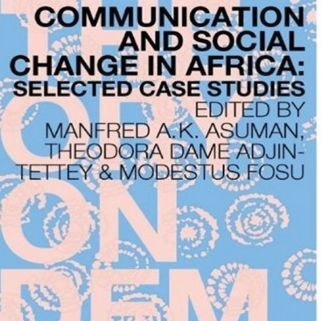Scholars of communication from across Africa and Europe hailed the unveiling of “Communication and Social Change in Africa: Selected Case Studies,” a groundbreaking book that offers fresh insights into the role of communication in driving social transformation across the African continent.
Speaking during the virtual launching of the book on Friday, Dr. Stanly Ukpai, Director of Project at the development Research and Projects Centre, dRPC, described the book as a game-changing masterpiece that would help to address the lopsided nature of development and communication paradigms often dominated by Western perspectives.
Dr. Ukpai promised to make the book available to different universities across the continent through the help of the MacArthur Foundation.
“The book addresses the growing demand for decolonizing knowledge production in communication studies, challenging the dominance of Global North perspectives. It offers insights into how communication is leveraged for social change in various African contexts, from health interventions to political campaigns,” he said.
In a presentation during the launch, Malam Hassan Karofi, the Director of Partnerships and Communication at the dRPC, commended the diverse nature of the book, particularly for focusing on real case studies across Africa.
Mr Karofi highlighted the importance of Advocacy Communication for family planning policy change as demonstrated in their case study of Gates Foundation funded program in Northern Nigeria between 2015 and 2023.
He commended the MacArthur Foundation for supporting the launaching of the book which he described as a pioneer in African communication.
The book, which was edited by Dr. Manfred A. K. Asuman, Dr. Theodora Dame Adjin-Tettey, and Professor Modestus Fosu, brings together a diverse collection of case studies showcasing authentic African voices and experiences in the field of communication studies.
Participants from diverse backgrounds were drawn from various countries such as Nigeria, Ghana, South Africa, Tanzania, Canada among others.
Franz Krüger, in the book’s foreword, emphasises the importance of understanding African media on its own terms rather than as following trends from the Global North. The collection is described as answering the call for centering African approaches in academic discourse.
Published by the Institute of Network Cultures in Amsterdam, this book promises to be a valuable resource for academics, students, NGOs, and communication professionals interested in African perspectives on media and social change.
Key features of the newly released book include contributions from scholars across Africa, covering countries often underrepresented in academic literature; a focus on various communication forms, with particular emphasis on community radio’s impact; exploration of traditional African cultural systems and their intersection with modern communication technologies; and chiefly, the book examines Communication for Social Change (CSC) initiatives and their effectiveness in improving living conditions.
The unveiling of “Communication and Social Change in Africa: Selected Case Studies” marks a significant milestone in the field of communication studies, offering a platform for African scholars to present their research and contribute to a more nuanced understanding of communication dynamics on the continent.






